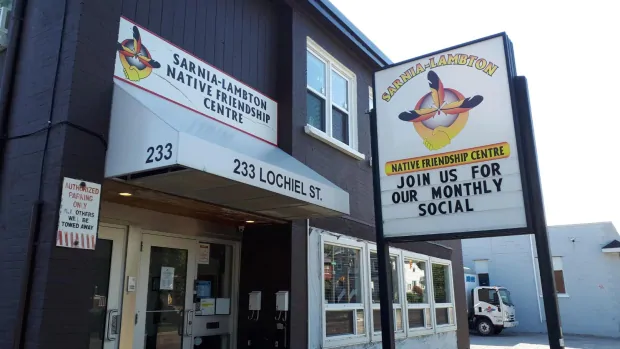Indigenous community wants answers after Sarnia Friendship Centre closes doors

More than four months since the Sarnia-Lambton Native Friendship Centre’s doors were shut under unexplained circumstances, Nathalie Landry continues to open her heart — and her own door — to struggling members of Sarnia’s urban Indigenous community.
Landry has invited clients and their families to her home numerous times, hoping to alleviate the effects of homelessness, poverty and loneliness after the Centre — a gathering place, cultural school and social service provider — was closed and most of the staff fired in September.
Landry’s group even arranged a December holiday party at a nearby community centre, complete with a turkey dinner prepared by volunteers using donated ingredients.
The Centre serves different groups of people, including the homeless, and Landry said she’s seen changes on the streets of Sarnia since the shutdown.
“It’s not nice right now. People are suffering. A lot of people are getting back into the drinking and drugs,” said Landry.
Last September, the Friendship Centre closed without warning. Past employees and program participants said that six employees were fired, leaving only two workers. After several weeks, the building — which is close to downtown Sarnia — reopened for morning coffee two days a week, but other services didn’t resume.
Centre helped Indigenous youth learn about heritage
Jeff Dolson, originally from the Munsee-Delaware community near London, said he relies on the Centre to help his daughters, ages eight and nine, to learn about their heritage.
The girls used to go to classes for archery, drumming and dancing, but now “we’re lost, left hanging,” said Dolson, adding that there was tutoring with school work and female mentoring for the girls, who “have no mother in their life.”
“Now there’s nothing, just a blank space for us to fill.”
Another parent, Sarah MacMillan, said the centre has been instrumental in helping her adopted sons discover “who they are.”
“If it weren’t for the Centre, we [their parents] would still be walking in the dark,” said MacMillan. “We made it our business to make sure he had the Friendship Centre around [them] to help [them] learn and grow and know who [they are].”
‘We don’t know what’s going on’
MacMillan is frustrated with the lack of information from the Centre’s governing board.
“We don’t know what’s going on. They’re not giving us any information,” said MacMillan. “My concern is getting those doors back open.”
Several former employees refused to comment publicly about the Centre’s closure. One expressed reluctance due to possible legal action.
James Elliott’s partner helped arrange care and support for Indigenous seniors and others with disabilities, until she was caught in the mass firing over issues surrounding the return to work of the Centre’s former executive director.
“It was a disaster,” said Elliott. “A lot of people got fired over things that should never have happened. They had no grounds for dismissal. The board of directors are supposed to help but they have been doing the opposite.”
Deborah Munroe at the Centre, who described herself as the new executive director, declined to comment on the closure or resumption of services. Board members contacted by phone or email either refused comment or did not reply.
Munroe said a statement was forthcoming from the board, but nothing has been received.





